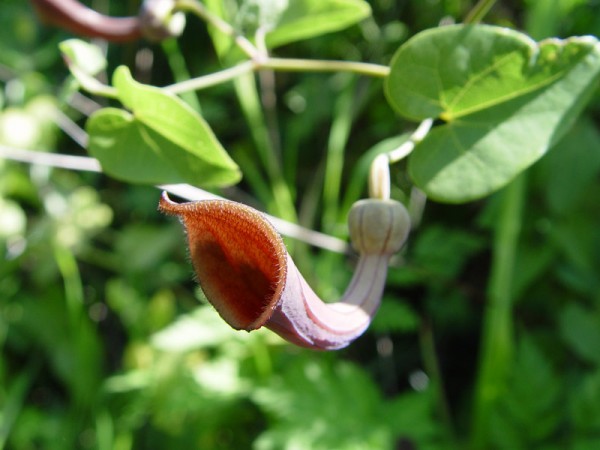Common Herbal Supplement Linked to Cancer

Another case for assuring correct supplement/herbal use with your Naturopathic Doctor.
from Science Now (8.9.2013):
Common Herbal Supplement Linked to Cancer
Carsten Niehaus/Creative Commons
Vicious vine. Leafy, flowery vines called Aristolochia are used in an herbal supplement that may cause cancer.
SHANGHAI, CHINA—Many people turn to herbal supplements to improve their health. In China, belief in traditional medicine is so strong that pharmacies peddle unprocessed herbs alongside modern pharmaceuticals. But an ingredient found in certain supplements may be as cancerous as smoking, two new studies have found.
The ingredient in question is aristolochic acid, a compound found in leafy, flowery vines called Aristolochia, or birthwort. For centuries, birthwort has been used in traditional medicine in China (and ancient Greece before that) to treat arthritis and ease childbirth, among other conditions. (The flower is shaped like a uterus.) Today aristolochic acid—pronounced “a-ris-to-LOW-kick”—is found in supplements for weight loss, menstrual symptoms, and rheumatism. It’s widely used in Asia, where it’s added to medicinal wine, ointments, and diet pills. One study found that between 1997 and 2003, fully one-third of Taiwanese were prescribed birthwort supplements by a Chinese medicine practitioner.
Warnings about the herb first emerged in the early 1990s, when a scandal involving dozens of women in Belgium who had inadvertently taken it for weight loss surfaced. As reported in The Lancet in 1993, several of the patients developed severe kidney failure.
Soon after, scientists discovered a link in the rural River Danube region between kidney damage and wheat that had been contaminated with birthwort when seeds from the two plants mixed during the harvest. In 2001, the Food and Drug Administration issued a consumer advisory note about dietary supplements and other products containing aristolochic acid, calling for its use to be discontinued. By 2003, many countries—including Taiwan—had banned the substance. The International Agency for Research on Cancer has classified herbal compounds derived from birthwort as Group 1 carcinogens, which means there’s sufficient evidence that it causes cancer in humans, not just animals.
But such supplements remain available from traditional Chinese practitioners and over the Internet, notes Bin Tean Teh, a cancer researcher at the National Cancer Centre Singapore and the National University of Singapore (NUS) and the corresponding author on one of the new papers, which appear this week in Science Translational Medicine. And although a few studies had shown a link between birthwort and either upper urinary tract cancer or kidney disease, they had only traced the mechanism as far as mutations on one gene: P53, a gene commonly associated with cancer. “I thought there should be more than that,” says Teh, who has long been struck by the fact that Taiwan, with high use of supplements containing birthwort, also has the highest known incidence of upper urinary tract cancer in the world.
To get a broader picture, Teh and colleagues sequenced tissue from nine Taiwanese patients with upper urinary tract cancer who had taken birthwort. From previous research, scientists know that carcinogens like cigarette smoke leave genetic fingerprints on a person’s genome, in the form of characteristic alterations in the letters that make up DNA—sometimes thought of as “spelling mistakes.” Because upper urinary tract cancer manifests itself in the kidneys, the researchers used the latest genetic sequencing methods to examine cancerous kidney tissue side by side with nearby nontumorous tissue. In the malignant tissue, they found up to 1500 genes with mutations—a level higher than has been found for either lung cancer in smokers or skin cancer in patients with heavy exposure to ultraviolet radiation. “People always thought it was one gene” affected by birthwort, Teh says. “We found it was thousands.”
Meanwhile, a scientist on the team who had been looking at sequences from a patient with liver cancer noticed a strikingly similar genetic fingerprint. Using the same procedure, the group found that birthwort may be responsible for that cancer as well—the first time the herb has been associated with liver cancer.
The study is the last nail in the coffin for birthwort, says Steven Rozen, a cancer genetics researcher at Duke-NUS Graduate Medical School in Singapore and Duke University Medical Center in Durham, North Carolina, and an author on the paper. “This is a pretty clear story,” he says. “These plants are very dangerous.”
The second paper, by another group of authors in the United States and Taiwan, arrived at similar results. After sequencing tissue taken from 19 Taiwanese patients with upper urinary tract cancer, the researchers found that a control group of patients with upper urinary tract cancer but no history of birthwort use did not show the same pattern of mutations.
The work raises new diagnostic possibilities, says Marc Ladanyi, a cancer researcher at Memorial Sloan-Kettering Cancer Center in New York City. Someday, the first clue that a patient has ingested birthwort could come not from the person’s clinical history, but from the herb’s powerful genetic fingerprint, he says. If found in patients living in places not widely known to have birthwort exposure, such a fingerprint could be a sign that public health campaigns are needed.

